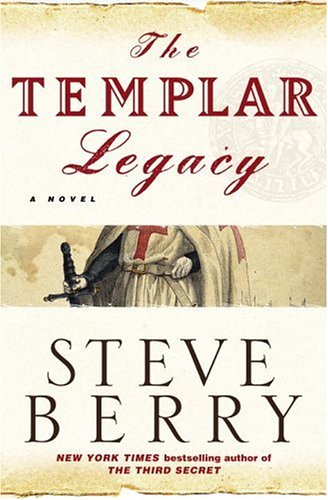The Templar Legacy

ISBN 978-0-345-47615-9
Back in the early 2000’s everyone went a little crazy over Dan Brown’s The DaVinci Code. It was not the case that there was no mystery, but of course, Brown had the incentive of wanting to sell copies of his book, so mystery that was legitimate overlapped with fancy that made for good storytelling. Determining where those boundaries are though, is a subject of mass debate even still.
The Templar Legacy, by Steve Berry, is a blatant mercenary attempt to cash in on the Brown craze. This version goes to France into the mysteries of the Cathars and Knight’s Templar to do so. The premise is that the former master of the order knows a Templar Schism is coming and that the Knight’s Templar is going to be torn asunder over an old problem relating to the dissolution of the order some 700 years ago. As the master dies, he develops a plan and has all the pieces in place to allow a host of characters to discover a hiding spot of Templar treasure and knowledge.
Spoiler
Spoiler alert: Mostly the plot revolves around how The Messiah (Yeshuah) in the book, was never actually crucified.The adventure part of the novel reads well, but due to the spoiler I mentioned above the entire novel is tiring to read in the same way listening to a lecture by Richard Dawkins is tiring. The idea that the Templars are some kind of heretic is nothing new, but this book does little by way of helping that assertion to become resolved. If anything, it worsens that accusation in order to sell the book to people who might be interested in such a story.
So yeah, there are Departments of Justice, intrigue, and billionaires in this thing, but it reads like a heaping wad of suck since the basic premise is to try to create some alternate history that has already had a million versions offered and put forth. It’s not that the writing is bad. It’s not that the plot and supporting facts are terrible, but when you go so far as to make your own “Testimony of Simon” which reads like something an egotistical five-year-old might write, the line must be drawn.
While the novel poses as ‘fiction’ it looks instead to be a special kind of pleading–the goal of the plea being ‘All religions suck!’ and everyone is bad but the true people who know that everything is fiction! Okay, but the actions of the Templars fly in the face of this very thing. Yes, they got ‘burned’ over what seems to be mostly a monetary issue, but they had all that money from doing something else other than having super secret information. It involved keeping the roads to Jerusalem clear which began in earnest due to the Crusades. I rather doubt that they got to Jerusalem and discovered any form of knowledge that had to do with the Holy Land being a lie. If anything, they probably discovered that the entire truth was not being disclosed by the Catholic Church which ordered the Crusades with which to start.
Hence, making up a fiction about burned people who were sacrificed for religious reasons to sell a book is in poor taste. The only thing worse might be making a fictional book about the Holocaust and saying how the Jews actually deserved it due to some “secret history” that legitimizes Nazi actions.!
